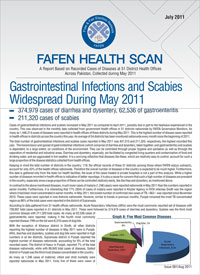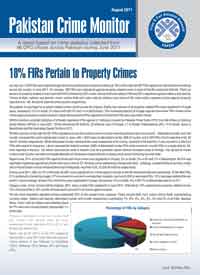- Doctors and staff without accommodation in more than a quarter of BHUs
- Maternal health neglected in 30% BHUs
A Report Based on Monitoring of 110 Basic Health Units across Pakistan in July 2011
ISLA MABAD, August 25: A FAFEN monitoring report on Thursday said an overwhelming majority of patients visiting 110 Basic Health Units (BHUs) across Pakistan in July 2011 complained about unavailability of free of cost prescribed medicines at in-house pharmacies.
FAFEN Governance Monitors noted that 85% of the monitored BHUs had stocks of medicines and 89% were issuing them free of cost to patients. But 86% of 90 patients interviewed at the premises of BHUs complained that not all prescribed medicines were available and that they had to purchase some from the market.
The report said compared to monitoring reports on BHUs since April 2010, the stocks and availability and issuance of free of cost medicines have improved by at least nine and five percentage points. However, the huge number of patients’ complaints in July 2011 suggests that despite the improvement, patients’ needs for medicines are not adequately met at these primary healthcare facilities.
About infrastructural issues, the report said in July 2011 the monitored BHUs lacked basic amenities, essential equipment, maternal health facilities, and staff to run disease control programs. It said 65% lacked wheelchairs, 49% stretchers, 37% working oxygen tents, 22% sterilizers and 12% did not have syringe cutters. “Basic amenities like clean drinking water, washrooms with running water and properly shaded waiting areas were not present in more than 15% of the monitored BHUs.”
It said mini laboratories were lacking in 80% of the BHUs, including the one in Islamabad Capital Territory (ICT), one out of two in FATA, 90% in Punjab and at least 60% in other regions.
Additionally 31% and 26% of the 110 BHUs did not have residential houses for doctors and other staff on the premises. The report called for providing doctors and other staff residences so that they are easily available and patients receive timely treatment.
The report said maternal health was also in a state of neglect. Maternity beds were not present in 39% of the monitored BHUs, while 30% lacked labour rooms. More than 70% BHUs in Balochistan and Khyber Pakhtunkhwa lacked labour rooms, as did a quarter in Sindh and 8% in Punjab. Maternity beds were not present in 68% BHUs in Khyber Pakhtunkhwa, 57% in Balochistan, 31% in Punjab and 19% in Sindh. Delivery kits were not present in 16% of the monitored BHUs nationwide.
BHUs also lacked staff to treat TB patients and to run the Control of Diarrheal Diseases (CDD) and Malaria Control Program (MCP). As many as 40 out of 110 BHUs did not have staff to treat TB patients. The report said nationwide 92% of the monitored BHUs did not have generators for power backup, terming it a worrying aspect given the frequent power outages in the country. “These included all BHUs monitored in ICT, FATA and Balochistan, 95% each in Punjab and Khyber Pakhtunkhwa and 69% in Sindh.
FAFEN monitors visited 110 BHUs in 66 districts in July 2011. Sixty two BHUs were visited in 31 districts in Punjab, 22 in 15 districts in Khyber Pakhtunkhwa, 16 in 10 districts in Sindh, seven in as many districts in Balochistan, two in as many agencies in FATA and one in ICT.
About FAFEN:
FAFEN is a network of 42 civil society organizations working to foster democratic accountabilities in Pakistan. It is governed by the Trust for Democratic Education and Accountability.



